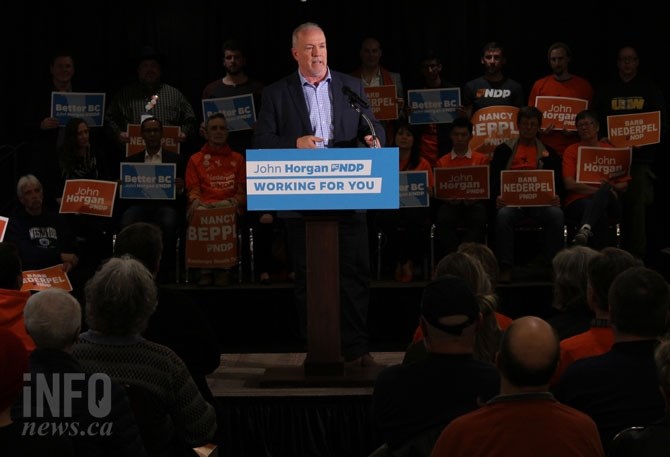
FILE PHOTO: B.C. NDP leader John Horgan at a rally in Kamloops, March 27, 2017.
(BRENDAN KERGIN / iNFOnews.ca)
May 05, 2017 - 6:00 AM
VANCOUVER - British Columbia's opioid crisis became a focal point of the province's election campaign on Thursday after receiving less attention than other issues, despite the ongoing death toll.
Fifteen people died of overdoses in Vancouver last week alone, which brought the total number of deaths this year to 117 and led Mayor Gregor Robertson to issue a statement demanding action from the next provincial government.
"This crisis is B.C.'s most tragic public health emergency in decades, and yet urgent health-care interventions that could immediately save lives are not being facilitated," said Robertson, a former NDP member of the legislature. "The next provincial government needs to immediately take action on the overdose death crisis because the current government's approach is not working."
The NDP has promised to create a standalone Ministry of Mental Health and Addiction, among other measures, while Liberal promises include $12 million for up to 28 youth addiction treatment beds and $2 million for the new B.C. Centre on Substance Use.
New Democrat Leader John Horgan said Christy Clark's Liberal government declared a public health crisis a year ago and yet the problem has gotten worse.
"It strikes me we're not doing enough to address this," he said at a campaign stop in Richmond. "I want to make sure there's a minister responsible for mental health and addictions who gets up every day to make sure we're making progress on this health crisis, not just ignoring it."
He wouldn't say how much an NDP government would spend on the crisis if the party wins Tuesday's election, saying to assume what is needed five days before an election would be presumptuous.
Earlier, Horgan visited a Vancouver fire hall where he noted the difficult circumstances affecting firefighters caught up in the overdose crisis.
Dustin Bourdeaudhuy, vice-president of Firefighters Union Local 18, said they desperately need more help.
"We went on 700 overdose calls in the month of April. That's just unheard of. There needs to be some funding coming to help out the municipalities from the provincial and federal governments. We're not seeing that quick enough and it needs to happen now."
Clark's campaign also stopped in Vancouver, where she brushed off comments from Alberta Premier Rachel Notley that B.C. lacks the legal authority to ban thermal coal shipments through its ports.
"I appreciate their view. I would say, though, that Albertans are less familiar with our legislation than I am and we've been working on this for several months. I think, though, that the federal government after the election, should we be re-elected, will heed our call to ban thermal coal."
Clark has asked the federal government to ban the export of thermal coal through B.C. in response to a new tariff on Canadian softwood exported to the United States. Most of the coal comes from the United States but Clark's promise of a $70-a-tonne carbon tax would also hurt Alberta.
Liz Edinger, a law professor at the University of British Columbia, said she doubts Clark can follow through regulating thermal coal exports because it may come too close to the federal jurisdiction of international trade.
But she said it's a grey area and B.C. could have the authority, depending on how it frames any legislation.
"It's the context, the circumstances, in which it is being done or imposed, which make it look a little bit iffy," Edinger said.
"What are they really trying to do here, just clean up the environment? Fine, that seems perfectly legit," she said. "But it could be that there is another purpose, to control and affect international trade. That's a no-no. You can't do that as a province."
Green Leader Andrew Weaver said April was the strongest month ever in donations received for the B.C. wing of the party.
"We banned corporate and union donations as a matter of principle, because it was the right thing to do," he said in a statement. "As a result, our fundraising has increased."
The party didn't release the value of the donations.
News from © The Canadian Press, 2017